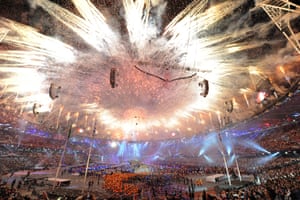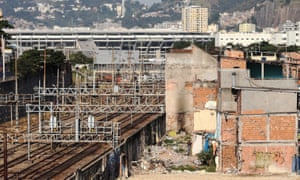In July 2005, a few days after London was awarded the 2012 Olympic Games, I took the Docklands Light Railway to Pudding Mill Lane. It was a journey I have repeated at intervals ever since, before and after the Olympics – but not during, when the authorities deemed it helpful to shut the station most convenient for the main stadium.
Eleven years ago this was an ugly, forgotten area full of grubby but useful businesses: small factories, reclamation yards, purveyors of obscure car parts. It had the kind of unplanned, bottom-up energy more associated with south Asia than London. Likewise the streets, which were filthy and (there was a heatwave) fly-blown. In the canal I found half a motorcycle. Under the railway bridge was a sign reading “Fuck the Bid”.
I made the journey again this month, as the Rio Olympics, which starts next Friday, heaves into view. I turned left as of old, under the now graffito-free bridge. There was still building work going on – for Crossrail and on the stadium itself, the new home of West Ham United. Within moments I was shouted at, hauled back and ordered to take a circuitous route into the Olympic park, now a huge grey, puddly open space, windswept even in July, broken up by its three main landmarks: the stadium, the Aquatics Centre and the ArcelorMittal Orbit, now half-converted into a helter-skelter, and surely the most repulsive piece of public art ever commissioned.
The canal had indeed been beautified and the “park” was surrounded by trees, but uncomfortable-looking ones, just like those planted for the Beijing Olympics, which had the air of having been force-marched in from the countryside at bayonet-point. London has wildflower beds, but even these were regimented. The prettiest things in sight were the cranes over Stratford, creating unplanned, temporary geometrical shapes against the sky. Old Olympic parks across the world are habitually forlorn: two weeks of glory, decades of rot.
The Aquatics Centre does seem well used, though nearly all the water is divided into Olympic-type lanes for the dutiful swimming favoured by office workers, rather than the wet larks of childhood. A few people were in the Orbit. And the centrepiece of Sebastian Coe’s much-vaunted legacy, the stadium itself, was about to stage last weekend’s Anniversary Games, an event so important that at dawn on Monday it was not in the top 18 stories on the BBC Sport home page. Next month the stadium will go into regular use – unlike those in Athens and Beijing – as the de facto property of London’s fourth-best football team: an almost free gift from the British people to that most deserving of causes, a Premier League club.

I am not anti-sport: I have happily spent much of my working life as a sports writer. I am not anti-Olympics: I have reported seven Games in all, and have rich memories. I believe a passing alien would regard the event’s existence as a tribute to our planet, the Paralympics even more so.
I am, however, an Olymposceptic. I always opposed holding them in London, and never wavered even during the 17 days four summers ago when even my staunchest allies faltered. I felt like the man in trunks on a nudist beach; the unbeliever at a mass Moonie wedding. Late one night I bared my soul to a kindly colleague who had spent seven years covering every detail of the build-up. “I drank the Kool-Aid,” he admitted. “It was the only way to cope.” The London Olympics met no genuine national policy need, not one. But they were conceived under one prime minister who preferred the show to the substance, Tony Blair, and executed under another, David Cameron.
In 2012 Britain did not need to rehabilitate itself from utter national disgrace (Tokyo 1964, Munich 1972), nor impress its progress on an unknowing world (Seoul 1988), nor spend billions on a tourist advertising campaign (Barcelona 1992). There would have been a purpose had the Birmingham and Manchester bids of the late 20th century succeeded: rebalancing the economy away from the south-east. But they were always doomed.
No lasting benefit from London’s agreeable binge has ever been authenticated: east London would have been bourgeoisified anyway, if that’s a benefit. The alleged effect on making youth leap off their sofas and on to sports fields was a chimera: a study quoted in the vital text on the whole Games-hosting industry, Circus Maximus by Andrew Zimbalist, showed that no Olympics has ever achieved that.
And personally, I seriously doubt the endlessly quoted figure of £9bn as the true cost of the London Olympics. Once Blair’s original back-of-a-fag-packet numbers were junked shortly after the bid was accepted, this number became holy writ. I have no evidence to challenge it whatever, except my memory of the scoreboard in Greenwich Park, site of the equestrian competition. It was inadequate and barely visible. This made me realise the extent to which everything else was working brilliantly. On time, as it had to be, on budget, perfectly done. In Britain? No secret Treasury slush fund? No sleight of hand? Really?
The good thing about Britain is that the rule of law applies. The homes of the poor, the hutongs and favelas, could not be whimsically bulldozed, as in Beijing or Rio. The process of expelling the businesses, as detailed by the salmon smoker Lance Forman in his new book Forman’s Games, was a very British one: furtive, grinding, mean-minded. I first visited Forman’s old factory, close to Pudding Mill Lane, that day in 2005. I may have unknowingly trodden the same spot this month.
Forman got a good deal in the end, because he fought the various bodies driving the clearances hardest and longest – at the expense, he once told me, of actually running the business. Others accepted their fate and disappeared, grumbling, to new and less desirable sites in Essex and elsewhere. “You can’t stand in the way of progress,” as a more pliant generation used to say when motorways scrunched their homes in the 1960s.
The question that now has to be asked is to what extent the Olympic Games, in its current form, does constitute progress. London was a relatively benign example. Look at the bigger picture and the Olympics are failing on multiple levels: economic, political, humanitarian. And sporting.
Zimbalist cites 19 different reports from 2002 onwards showing that Olympic and World Cup hosts derived minimal or negative benefits in employment, tourism and general growth. The empty hotel room has become as much a symbol of the Olympics as the five rings. Mostly, as in London, this reality is tucked away under layers of propaganda, although the locus classicus remains Montreal 1976. “The Olympics can no more have a deficit than a man can have a baby,” swanked Mayor Jean Drapeau. That baby was 30 years old before the city paid off the debt.
Awareness of the Olympics’ dark side is growing. Brazil has been in ferment. Tokyo, the 2020 host, is restless. Boston and Hamburg had to stop bidding for 2024 because of protests. By the 2030s it will probably only be only egomaniac leaders, mostly unelected, who will even dare to get involved.

The IOC loves to present itself as a force for good in international relations. But the Russian drug scandal is a reminder that, as in the three successive Games in the 1970s and 80s at which one bloc or another staged major boycotts, the Olympics can be an irritant rather than soothing balm.
The humanitarian cost? A decade ago the Geneva-based Centre on Housing Rights and Evictions (COHRE) reckoned that in the previous 20 years, starting with 720,000 forced evictions before Seoul 1988, more than two million people had lost their homes to provide Olympic venues. That was before a final figure could be estimated for Beijing 2008, let alone Rio. Sadly COHRE now seems to be defunct; perhaps the office was demolished.
Sizewise, the Games are out of control. The IOC is beset by claimants – administrators for lesser sports – who are desperate for a slice of the action. The Olympics likes young sports such as skateboarding and big sports like tennis and, new this year, golf and rugby, though it degrades its own brand by staging second-rate tournaments. To the heroic zillionaire stars of those sports, the whole thing is at best an optional extra, often a distraction, and at worst a source of holy terror. (“OMG! They have mosquitoes in Brazil! I’m not going!”)
All this is in part an essential distraction because interest in the main Olympic product, athletics, is in freefall after decades of drug crises that the IOC has done its utmost to ignore. I have often spent the days beforehand asking locals which part of the Games they are looking forward to. The answer, almost invariably, is either the opening ceremony (which is interminable) or the 100 metres (which lasts nine seconds). It is rare now for stars to come from nowhere, like the eastern European gymnasts of the 1970s, to captivate the world. Each country seems to stage its own Olympics now, cheering on its own performers, mediated by its own one-eyed TV commentators and idiot interviewers (“How special was that?”), ignoring foreigners.
For Britain, a gold medal was quite special in the days when the total haul was four or five. It was 19 in Beijing and 29 in London. And yet what we ought to know by now is that this is essentially transactional. Well-funded elite programmes lead inexorably to medals: an estimated £4.5m per gold in London. There is no trickle-down; if anything these handouts sap money that could have been better used on well placed and much-needed facilities. If the number of golds goes back down to single figures, I shall treat that as a tribute to George Osborne.
The IOC used to deprecate the medals table: the concept of a nation “winning the Olympics” was considered contrary to the Olympic spirit. But increasingly that’s not what is meant by winning. London and Rio were deemed to have “won” the Games by staging them, pyrrhic though these victories have proved.
It does not have to be so dreadful. It is this ceaseless search to find the next host that is most of all wrecking the Olympics, inducing cities to fritter billions on facilities that have no useful afterlife and destroy the lives of the poor who get in the way. The same process has produced such monstrosities as the 2014 Sochi Winter Olympics and, lying in wait for us all, the 2022 Qatar World Cup.
For the summer Games at least, there is a potential solution: returning the Olympics to its ancient home. Greece is ideally placed geographically. Athens produced a serviceable Games in 2004, after much panic, cockup and, doubtless, corruption beforehand. It is now thought to have a world-record number of venues rotting away to no purpose. Take away the need to start from scratch every four years and the event – even allowing for Greece being Greece – could acquire the orderliness and patina of tradition and calm programme of improvements that attend the golf at Augusta and the tennis at Wimbledon.
Once that happened, tourists would no longer shy away; billions would dream of attending the Olympics once in their lives, and millions would do so. It would also make a secure profit that would allow facilities to be built globally where they are needed. Yes, there would be downsides and implacable opposition. Much of that would come from US TV. The killer opposition, however, would come from within the IOC itself.
No more would presidents and prime ministers grovel to them for the right to stage the Games for their own aggrandisement and the impoverishment of their populace. The IOC would just be a group of sports administrators, charged with running decent, sustainable and non-destructive sporting contests. And where’s the fun in that?



